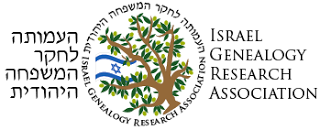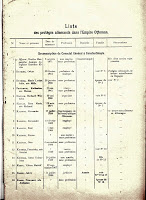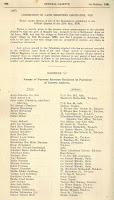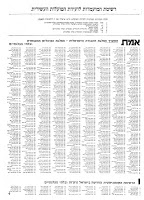
As mentioned previously I have been involved in the past year in building a new genealogy website in Israel, genealogy.org.il, for the Israel Genealogy Research Association (IGRA). The site has already been recognized as one of the top 40 international genealogy sites by Family Tree Magazine. One of the big issues I’ve had to deal with recently was upgrading the site to deal with high number of users. The original server the site was on was not able to handle the numbers of users we were getting, and we’ve now moved the site onto a much better server that can handle the site, and allows us to easily add capacity as needed (something impossible on our last server).
While I’ve been working on the nuts and bolts of the site, certainly the reason the site has been so successful is not my work, but more the work of the many IGRA volunteers, led by Rose Feldman, who have been adding dozens of new databases to the site. Their productivity is frankly mind-blowing. Since we launched in January of this year, Rose and her volunteer army have added nearly 50 new databases to the site, and more are coming on-line all the time. Think about that – they are adding more than a database each week. This is only the beginning.
Databases are categorized into three time periods:
- Ottoman Administration (pre-1917)
- British Administration (1917-1948)
- Israeli Administration (1948-)
For those researching Jewish relatives, these databases can help pinpoint where a relative may have been living at specific points in time, and can lead you in new directions in your research. Some records include the person’s exact address.
Databases include things like voter lists, lists of registered lawyers, accountants, doctors and nurses, candidates for various elections, phone books, burial lists, etc. There are over 60,000 records in the database now, and each record contains multiple pieces of information.
The current databases include:
Ottoman Administration (-1917)
- List of Students & Staff of Gymnasia Haivrit, Yaffo 1908-9
- Kollel List 1912 Safed (population register of families receiving funds “haluka“)
- Safed Burials 1433-2000 from the new cemetery and part of the old cemetery

British Administration (1917-1948)
- Births in African and Asian Protectorates for the Years 1916-1940
- Drishat Shalom (Regards) 1919
- UK Passport requests made in Safed 1921- 1951
- Donors from UK for Safed Old Age Home run by Simcha Shulman 1924-1929
- First National Conference of Edot Hamizrah in Eretz Israel – Protocol 1925
- Nurse Certification 1923-1948
- Earthquake Donations 1927
- Voters’ List for Haifa 1928
- Queries about Land Registries 1928-1929
- Queries about compensation for loss of property during the disturbances of 1929
- Voters’ List for Municipal Council Petah Tikva 1930
- Members of Agricultural Organizations in Petah Tikvah 1931-1936
- Voters’ List for Municipal Council Petah Tikva 1932
- Voters’ List for Municipal Council Safed 1932
- Galician Kollel Safed 1932
- Voters’ List from Petah Tikva for the 18th Zionist Congress 1933
- List of Sephardic Males in Safed 1934
- Award of Silver Jubilee Medals 1935
- Rehavia Address Book June 1935
- Deaths in African and Asian Protectorates for the Years 1936-1940
- Members of the National Youth Aliyah Committee of Hadassah 1937
- Members of the Histadrut Hamorim (Teachers’ Council) 1939
- List of Teachers of the Dept. of Education of Havaad HaLeumi 1940-41
- Candidates for the 1941 Hahistadrut Haklalit
- Candidates for the 1941 Va’adat Hapoalot (The Women’s Workers’ Council)
- Hebrew Soldiers of the Yishuv who fell and perished in World War II 1940-1945
- Refugees in Mauritius 1944-45
- Swiss Aliyah Requests 1945
- List of Donors for Repairs of Mikva in Safed 1947
- Yahrzeit List from the Safed Old Age Home
- List of people who have files in Beit HaMeiri in Safed

Israeli Administration (1948-)
- List of registered doctors 1948-1957
- List of Candidates for the First Knesset (C0nstituent Assembly) 1949
- Candidates for the 1949 Hahistadrut Haklalit (General Council Elections)
- Candidates for the 1949 Moatzet Hapoalot (The Women’s Workers’ Council)
- Candidates for the 1949 Histadrut Hahaklaim (Farmers’ Council)
- Candidates for the 1949 Histadrut Hapekidim (Clerks’ Council)
- Candidates for the second Knesset elections 1951
- Practical Nurses 1951-52
- List of Candidates for the Third Knesset 1955
- Authorized People to act as Accountants 5716 (1955-56)
- List of Persons Authorized to Act as Lawyers in Civil Courts in 1956
- Authorized People to act as Accountants 5717 (1956-57)
- Candidates for the 1959 Histadrut Hapekidim (Clerks’ Council)
- Candidates for the 1959 Histadrut Hahaklaim (Farmers’ Council)

Some databases that are coming online soon, include:
- Rehavia Address Book June 1937
- Candidates for the 1959 HaHistadrut Haklalit (General Council Elections)
- Candidates for the 1959 Va’adat Hapoalot (The Women’s Workers’ Council)
The best news is that the launch of a new advanced search engine for these records is coming online very soon (as in days). Few genealogy societies, if any, will have the kind of advanced search capabilities we will have on the site. It’s an exciting time for researching genealogy in Israel.
To stay up-to-date on the launch of the new search engine and on the ongoing launch of new databases, follow IGRA on their Facebook Page (facebook.com/israelgenealogy) or via Twitter (twitter.com/israelgenealogy). Of course, if you want to comment on the web site and where it can be improved, you can always comment here and I’ll see what I can do.
Philip, I didn’t know about this project. It’s very exciting. Just curious: Do you know if microfilms at the Central Archives for the History of the Jewish People in Jerusalem are part of the project in the future? There are many from the IKG in Vienna that I’d love to be able to access
http://www.ushmm.org/research/center/acquisitions/details/vienna/
I believe IGRA is making efforts to work with the CAHJP, but the records IGRA will work on will likely concern Israel only, not Vienna. It’s just a matter of focus. IGRA, as an Israel-centered organization, needs to focus on Israel-related records. I’m sure if there is an organization who wants to take on indexing Vienna records, IGRA would be happy to share techniques and technology we’ve developed to handle database creation and display.